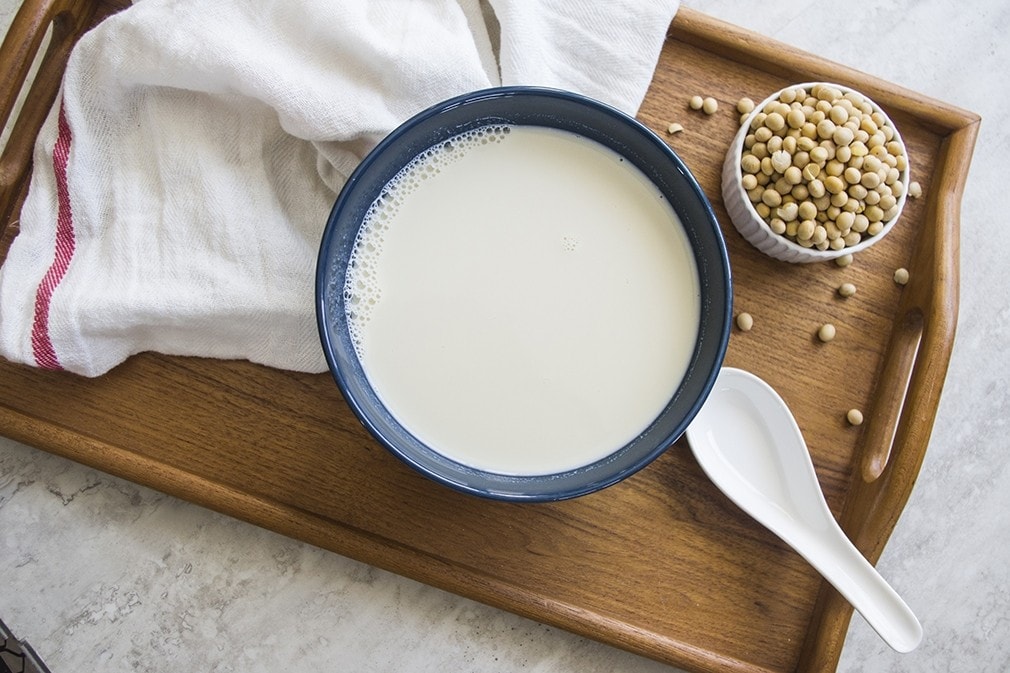As a dedicated explorer of breakfast rituals around the world, I stumbled upon a delightful mystery nestled in Chinese culture—the ubiquitous presence of soy milk. Prepare to be whisked away on a whimsical journey as I spill the soybeans on why the Chinese are fervently sipping this creamy elixir.
With a sprinkle of wit and a dash of curiosity, we’ll unravel the secrets of this morning’s concoction and its role in the Chinese culinary universe. Why is soybean milk popular in China?
- Ancient Origins: Picture this: a wise Chinese sage in ancient times, discovering the magic hidden within humble soybeans. Legend has it that this visionary concocted the first batch of soy milk, elevating breakfast tables across the land. This ancient practice of soy milk consumption has been passed down through generations, becoming a cherished tradition that awakens taste buds and fuels the day.
- Health & Longevity: Move over, kale smoothies! In Chinese culture, soy milk is revered as a health elixir brimming with nourishing properties. Packed with protein, vitamins, and minerals, it’s like a superhero’s secret potion for vitality and longevity. From building strong bones to boosting cardiovascular health, soy milk is the Chinese way of saying, “I’ll take a sip of health, please!”
- Culinary Chameleon: Soy milk is not just a beverage; it’s a culinary chameleon that adapts to various taste preferences. It serves as a versatile canvas for creativity in Chinese cuisine. Whether steamed custards, savory tofu dishes, or silky-smooth dessert soups, soy milk adds a creamy touch to countless recipes. It’s like the secret ingredient that transforms ordinary meals into flavorful adventures.
- Morning Rituals: Step into a bustling Chinese breakfast market, where the aroma of steamed buns and sizzling crepes fills the air. Amidst this symphony of flavors, you’ll spot locals huddled around steaming cups of soy milk. It’s the chosen companion to pair with breakfast delights, offering a satisfying sip that kick-starts the day with a gentle embrace. Like a morning hug for the taste buds!
Conclusion
As we conclude this delicious expedition into the realm of soy milk, let’s raise our cups to the Chinese for their devotion to this creamy elixir. From ancient origins to health benefits and culinary versatility, soy milk has become an essential part of Chinese mornings. So, dear reader, the next time you encounter a steaming cup of soy milk, remember the tales woven into each sip—stories of tradition, health, and culinary alchemy.
What is the history of soy milk in China?
The history of soy milk in China dates back thousands of years. Its origins can be traced to the Zhou Dynasty (1046-256 BCE), where the Chinese discovered the nutritional benefits of soybeans. However, soy milk as we know it today didn’t emerge until the Tang Dynasty (618-907 CE). During this period, the Chinese developed various methods to grind, boil, and strain soybeans to extract their milk-like liquid.
Soy milk quickly gained popularity due to its versatility and nutritional value. It became a staple in Chinese cuisine, especially for those who couldn’t afford or consume dairy milk. In addition to being consumed as a beverage, soy milk was used in various culinary creations, including tofu, soy custards, and dessert soups.
Over the centuries, soy milk continued to be a prominent part of Chinese culture and diet. It became deeply ingrained in breakfast rituals, with people enjoying it alongside steamed buns, savory pastries, and other morning delights. Today, soy milk remains a beloved and widely consumed beverage in China, offering a non-dairy alternative packed with protein, vitamins, and minerals.
The rich history of soy milk in China not only highlights its culinary significance but also reflects the ingenuity and resourcefulness of the Chinese people in harnessing the nutritional potential of soybeans. From ancient origins to modern-day consumption, soy milk continues to be a cherished part of Chinese food culture, nourishing both body and soul.
Is soy milk from China?
While soy milk is enjoyed in many parts of the world, it is not exclusively from China. Soy milk is a beverage made from soybeans and water, and its origins can be traced back to ancient China. However, soy milk is now produced and consumed in various countries worldwide.
China is indeed one of the largest producers and consumers of soy milk due to its historical connection to soybean cultivation and traditional culinary practices. Chinese brands such as Vitasoy and Yili have gained recognition for their soy milk products. However, soy milk is also popular in other Asian countries like Japan and Korea, as well as in Western countries where plant-based milk alternatives have gained traction.
Today, you can find soy milk in supermarkets and health food stores globally, with different brands and varieties to suit various dietary preferences and flavors. So, while China has played a significant role in the history and popularity of soy milk, it has become a global beverage enjoyed by people of diverse cultures and backgrounds.
Is Chinese soy milk different?
Chinese soy milk may have some variations compared to soy milk from other regions. Here are a few factors that can contribute to the uniqueness of Chinese soy milk:
- Preparation Techniques: Chinese soy milk often follows traditional preparation methods that involve soaking and grinding soybeans, followed by boiling and straining to extract the milk. These techniques may differ slightly from the methods used in other cultures, resulting in variations in taste and texture.
- Flavorings and Additions: Chinese soy milk can be enjoyed plain or with added flavorings such as sugar, sweeteners, or natural ingredients like almonds, sesame, or peanuts. These additions can give Chinese soy milk a distinct taste profile that sets it apart from other varieties.
- Culinary Usage: In Chinese cuisine, soy milk is not only consumed as a beverage but is also a key ingredient in various dishes. It serves as a base for making tofu, douhua (silken tofu pudding), and other soy-based delicacies. The specific soy milk varieties used in these culinary applications may have unique characteristics compared to those primarily consumed as a beverage.
- Regional Preferences: China is a vast country with diverse culinary traditions and regional preferences. Different provinces or cities may have their own variations of soy milk, influenced by local ingredients, techniques, and tastes. For example, northern China tends to prefer thicker and unsweetened soy milk, while southern regions may opt for a sweeter and smoother version.
Is Chinese soy milk good for you?
Yes, Chinese soy milk can be a healthy beverage choice as part of a balanced diet. It offers several health benefits:
- Nutrient-Rich: Chinese soy milk is a good source of protein, which is essential for muscle growth and repair. It also contains essential amino acids, vitamins (such as B vitamins), minerals (like calcium and iron), and dietary fiber. These nutrients contribute to overall nutrition and support various bodily functions.
- Plant-Based Alternative: For individuals who cannot consume dairy or choose to follow a vegan or vegetarian diet, Chinese soy milk serves as a nutritious plant-based alternative. It provides similar amounts of protein and can be a source of calcium when fortified.
- Heart Health: Soy milk is low in saturated fat and cholesterol, making it a heart-healthy choice. Studies suggest that consuming soy-based products, including soy milk, may help reduce LDL cholesterol levels and lower the risk of heart disease.
- Digestive Health: The natural dietary fiber present in soy milk can promote healthy digestion and contribute to regular bowel movements.
- Hormonal Balance: Soy contains phytoestrogens called isoflavones, which have mild estrogen-like effects. These compounds may have positive effects on hormone balance and menopausal symptoms in some individuals.
It’s important to note that individual dietary needs and preferences may vary. Some people may have soy allergies or sensitivities, so it’s recommended to consult with a healthcare professional or registered dietitian if you have specific concerns or health conditions. Additionally, it’s advisable to choose organic and non-genetically modified (non-GMO) soy milk options when available.
FAQ: About soy milk in China
China is the country that drinks the most soy milk. With its vast population and longstanding culinary traditions, soy milk has become a popular beverage choice in China. The consumption of soy milk is deeply ingrained in Chinese culture and is enjoyed by millions of people across the country.
Soy milk is popular in Asia for several reasons. Firstly, it serves as a suitable alternative to dairy milk for individuals who are lactose intolerant. Secondly, soy milk is seen as a healthy beverage choice due to its nutritional content and potential health benefits. Lastly, soybeans are widely grown and consumed in Asian countries, making soy milk readily available and culturally relevant.
Soy milk and cow’s milk have different nutritional profiles and benefits. Soy milk is a plant-based alternative that is typically lower in saturated fat and cholesterol compared to cow’s milk. It is also free of lactose, making it suitable for those with lactose intolerance. Soy milk is a good source of protein, contains essential amino acids, and is often fortified with vitamins and minerals. However, cow’s milk provides more calcium, vitamin B12, and vitamin D. The choice between soy milk and cow’s milk depends on individual dietary needs, preferences, and any specific health considerations.
Drinking soy milk every day can be a healthy choice for many individuals, especially those who have dietary preferences or restrictions such as lactose intolerance or a vegan/vegetarian diet. Soy milk is a good source of protein, vitamins, and minerals. However, it’s important to ensure a varied and balanced diet, as excessive consumption of any single food or beverage may lead to an imbalance in nutrient intake.
People with soy allergies should avoid soy milk. Those with thyroid issues should consult a healthcare professional before consuming large amounts of soy milk. Certain medications, such as those for hormone-related conditions, may interact with soy, so medical advice is advised.

